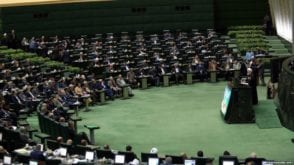Al-Monitor — A year after the start of protests in Iran, sparked by the death of Mahsa Amini, the US Congress has become more emboldened in its opposition to the Islamic Republic.
While Republicans and Democrats in Congress are divided on some aspects of Iran policy, particularly in regard to several recent actions by President Joe Biden’s administration, recent legislative activity, however, indicates broad opposition to the Iranian government in both parties and supports for the protesters.
‘Degrees of hard-line’
Amini was a 22-year-old Iranian Kurdish woman who died in police custody in Iran on Sept. 16, 2022, after members of the morality police arrested her for improperly wearing the mandatory head covering for women and allegedly beat her with a baton, killing her. Amini’s death unleashed massive and ongoing protests throughout Iran, and the government responded with a violent crackdown. The crackdown against the protests prompted Congress to take action as the one-year anniversary of Amini’s death and the start of the large-scale protests approached.
“It definitely hardened opinions in both parties,” Kenneth Katzman, a senior fellow at the Soufan Center, told Al-Monitor. “Iran has no friends in the US Congress. That’s patently clear.”
On Tuesday evening, the House of Representatives voted almost unanimously to pass the MAHSA Act, named after Amini, which calls on the United States to impose sanctions on Iran’s supreme leader, Ayatollah Ali Khameini, as well as its president, Ebrahim Raisi, for alleged human rights abuses and terrorism. The bill, introduced in January by Rep. Jim Banks, R-Ind., has yet to pass the Senate.
That same evening, the House passed a bill calling for sanctions against individuals involved in Iran’s production of missiles and drones as well as a resolution condemning the persecution of the Bahai, a religious minority, in Iran.
There is no debate in Congress over whether the United States should seek friendlier relations with Iran.According to Katzman, the only discussion is over how to get the Islamic Republic to bend toward US objectives.
“There’s no support for any real soft line, there’s only degrees of hard-line,” said Katzman. “There’s no one arguing for some new broad relationship with Iran. There’s only degrees of what to do to punish Iran and get it to compromise.”
This week, there were also two hearings on Capitol Hill about Iran. Republicans hold the majority in the House of Representatives and therefore get to decide on hearing topics.
On Wednesday, the House Committee on Oversight and Accountability’s Subcommittee on National Security, the Border, and Foreign Affairs held a hearing called “Examining the Biden Administration’s Failures on Iran.” The House Foreign Affairs Committee’s Subcommittee on Middle East, North Africa, and Central Asia also held a hearing titled “Iran’s Escalating Threats” on Thursday.
The hearings focused on the following recent developments in US-Iranian relations:
- US-Iranian talks on a prisoner exchange, which will also involve the release of $6 billion in Iranian funds currently frozen in South Korea due to US sanctions. In an Al-Monitor exclusive on Monday, Elizabeth Hagedorn reported the names of the prisoners whose release Iran is seeking.
- The Biden administration’s efforts to negotiate a new nuclear deal with Iran. Republicans have repeatedly accused the administration of seeking an informal deal with Iran in an effort to bypass Congress.
- Iranian military support to Russia to aid its war on Ukraine.
- Iranian oil exports to China.
- Attacks by Iranian-backed groups on US forces in the region.
Limited tools to pressure White House
Remarks from the two hearings reveal a partisan division on US policy toward Iran despite the overwhelming consensus on opposition to Iran’s suppression of the protests. Rep. Glenn Grothman, R-Wis., who heads the Oversight Committee’s subcommittee on National Security, started the hearing by accusing the administration of a “lack of transparency” in its dealings with Tehran, pointing to the Iran Nuclear Agreement Review Act (INARA), which requires the president to submit any “agreement” concerning Iran’s nuclear program to both the House and the Senate for review.
In the event of a deal being sent to Congress, lawmakers would have 30 days to review the agreement, during which time they could vote against it in a joint resolution of disapproval, or simply let the deal proceed without opposition. If Congress were to pass such a resolution of disapproval, the president could issue a veto, requiring a difficult-to-obtain two-thirds vote by the legislative branch to override it.
Katzman believes it would be “very hard” for Congress to thwart a new nuclear deal with Iran under INARA, in part due to the possibility of reaching an informal understanding with Tehran. “The administration has said they wouldn’t necessarily submit to Congress because it’s restoration of an agreement that was reached already,” he said. “The talk of an informal understanding wouldn’t be submitted either.”
Grothman also attacked the prisoner deal, saying the United States should not “incentivize” the kidnapping of Americans. To this end, the representative pointed to a recent statement by Raisi on the release of the $6 billion in funds pursuant to the deal. The administration said the $6 billion will only be used for humanitarian purposes, but Raisi told NBC on Tuesday that Iran will spend the money “wherever we need it.”
The funds will be transferred to “restricted” accounts in Qatar and can only be used for humanitarian trade, Reuters reported on Monday, citing a State Department document.
On the other hand, Rep. Robert Garcia, D-Calif., the top Democrat on the subcommittee, called former president Donald Trump’s withdrawal from the nuclear deal and reimposition of sanctions in 2018 “reckless,” pointing to Iran’s increased enrichment of uranium since then. Garcia also warned those at the hearing to be mindful of the “precarious” situation surrounding the negotiation to free the Americans detained by Iran.
“I hope that this hearing does not undermine the efforts to secure the release of these Americans,” he said.
Much of the expert testimony focused on the American prisoners. Michael Makovsky, president and CEO of the Jewish Institute for National Security, likened the release of the $6 billion to a “ransom payment” that will put Americans traveling overseas at risk.
“It defies logic to believe the US is paying $6 billion for five people,” said Makovsky. “It would be a historic hostage ransom payment. It would mark a huge cost for all Americans who travel or live abroad.”
Barbara Slavin, a fellow at the Stimson Center, defended the Biden administration on the issue. Asserting that there are “no perfect deals, no easy choices” with Iran, she said, “This is not ransom. This is not appeasement.”
The hearing held by the House Foreign Affairs Committee’s subcommittee on the Middle East was led by Rep. Joe Wilson, R-S.C., who accused the Biden administration of “emboldening” Iran, and said the release of the $6 billion amounts to “funding Putin’s murder of Ukrainians.” Wilson unfavorably compared the deal to the release of Michael White from an Iranian prison in 2020. White, a US citizen, was likewise freed as part of a deal with Iran, but the deal was a prisoner exchange and did not involve finances, according to reports at the time.
Wilson also alleged that the administration is “turning a blind eye to the evasion of oil actions.” US sanctions prohibit deals with Iran’s energy industry, but Iranian oil exports to China are nonetheless significantly increasing.
Rep. Dean Phillips, D.-Minn., the top Democrat on the committee, said Trump reneging on the Iran deal “harmed” US interests, pointing to the numerous attacks by Iranian-backed militias against US forces in Iraq and Syria since then. He also defended the prisoner deal, saying he hopes it “provides incentive” for Iran to “modify [its] behavior moving forward.”
Norman Roule, an adviser at the Center for Strategic and International Studies, argued at the hearing that political divisions in the United States are undermining Washington’s posture toward Iran.
“If [Iran] senses that our political divide in the United States can undermine those threats, then it simply waits because its leadership has sat in the same seat since 1979,” said Roule.
Further in regard to division, he stated, “I urge you to develop a bipartisan approach Iran’s actions on China.”
Iranian-American activist Masih Alinejad also spoke in favor of more bipartisan agreement on Iran, saying the United States should have “one policy” toward the Islamic Republic. She praised the passage of the MAHSA Act in the House, saying that it “gave hope to Iranian people.”
“Finally, we see a bipartisan bill to actually isolate the killers,” said Alinejad.
‘A toxic time’
Some observers criticized aspects of the hearings. Ryan Costello, policy director of the National Iranian American Council, said that the two hearings “seem aimed at kind of thwarting a prisoner swap.”
“It’s concerning that it’s been politicized,” Costello told Al-Monitor.
According to him, much of the discussion in Congress since the protests began has focused on ways to pressure Iran, while instead there should be more discussions of how the United States can help the Iranian people amid the protests.
“A lot of the conversation has really been pigeonholed into what additional pressure we can exert on Iran,” said Costello. “There hasn’t really been that corresponding discussion on . . . what would support people on the ground.”
Costello said he would like to see more discussion on facilitating remittances to Iran in light of US sanctions as well as more US visas for Iranians. He praised the move in February by Sen. Bob Menendez, D-N.J., to call for a humanitarian parole program for fleeing Iranian dissidents.
The political divisions on Iran make it difficult for US policy to move forward, according to Costello.
“It’s kind of a toxic time for a lot to happen on Iran policy,” he said. “And I think the Biden administration recognizes that.”
Republicans had previously criticized the administration on several Iran-related issues covered in the above hearings. Late last month, Rep. Michael McCaul, R-Texas, who heads the House Foreign Affairs Committee, claimed in a statement that Congress is being “kept in the dark” over the suspension of Iran envoy Rob Malley. The State Department announced in June that Malley was “on leave,” and Malley said his security clearance was under review, but few details are publicly known. The case has led to abundant speculation in Iranian media.
Republican opposition to the prisoner deal is also not new. Sens. Jim Risch, R-Idaho, and Tim Scott, R-S.C., led 26 Republican senators in writing a letter to Secretary of State Antony Blinken and Secretary of the Treasury Janet Yellen in August arguing that unfreezing Iranian assets to free Americans would set a “dangerous precedent.”
A group of Republicans and Democrats in both chambers wrote a letter to President Biden in August asking him to explain whether the threat of Iranian retaliation was preventing the offloading of Iranian oil seized earlier this year by the United States. The oil was subsequently offloaded in Texas.
With regards to the future, Katzman said the sanctions bills passed on Tuesday constitute “more of the same” from Congress when it comes to Iran. One new approach, he said, would be for Congress to pass an authorization for the use of military force against Iran. With no such authorization at present, the US can only respond after the fact to attacks by Iran-backed forces; it lacks the legal basis to preemptively strike Iranian targets.
“That would be new. It would definitely move the football,” said Katzman, clarifying that he does not necessarily think such legislation will be put forward. “It would be hotly debated, but that is something new beyond what Congress has been doing on Iran.”
 Shabtabnews In this dark night, I have lost my way – Arise from a corner, oh you the star of guidance.
Shabtabnews In this dark night, I have lost my way – Arise from a corner, oh you the star of guidance.



